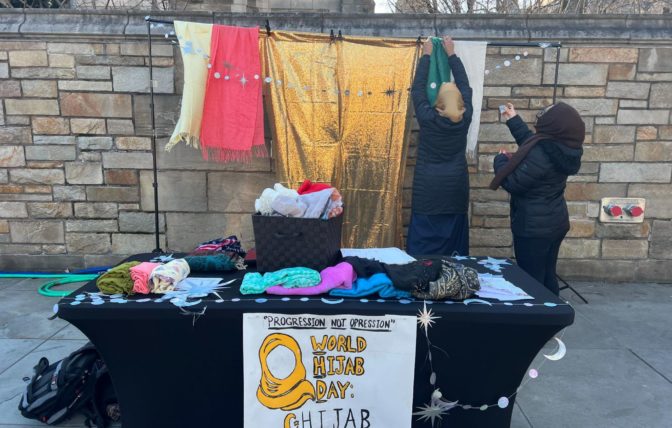
 "
"

 "
"

On February 1, the Muslim Students Association and Yale Women’s Center came together to celebrate World Hijab Day, joining groups in over 150 other nations who also spent the day honoring and advancing awareness of the hijab.
From 10:00 am to 4:00 pm, members of both organizations manned a booth on Cross Campus. MSA members shared baklava and gave visitors information about the hijab’s past at the booth. Also available for guests to try on were hijabs that the volunteers had brought from the Muslim prayer area on campus.
“The most meaningful part of the event for me was seeing all the photos taken at the hijab booth flood in and hearing about the various conversations that people had on their own shifts at the table,” MSA Political Chair Ilham Abdelkadir ’25 wrote in an email to the News. “Muslim women were able to bring awareness to how women today are facing discrimination on both sides of the spectrum: because of choosing to wear hijab and because of choosing not to.”
YWC employee and volunteer coordinator Huda Siddiqui ’25 told the News that five to seven students visited their booth every hour during last week’s WHD programming.
The day’s biggest takeaway for Abdelkadir and MSA member Fatima Kamara ’25 was seeing non-hijabi attendees try on the hijab.
“I think the most meaningful part of the event was getting people to try on the hijab,” Fatima Kamara ’25 said. “To me that represents how a piece of clothing provides not just freedom of expression but also a sense of solidarity/unity between women.”
Nazma Khan founded World Hijab Day in 2013. Khan was the only hijabi student in her middle school when she moved to New York from Bangladesh when she was eleven years old.
Khan echoed the views of MSA members like Kamara, noting that Kamara founded the WHD movement in order to promote cultural understanding and individual freedom of religious expression by inviting women from all backgrounds to wear the hijab for one day each year.
The hijab is frequently misinterpreted in Western contexts, according to MSA president Zahra Yarali ’24. The programming on Cross Campus from the previous week was designed to entice non-Muslims to discover more about the significance of wearing the hijab, which can mean different things to different people.
“I think it comes [down] to every person’s experience and story with it,” Yarali said. “Once you know what it means to or for any hijabi, it[s purpose] ends up making a lot of sense.”
Yarali claims that the World Hijab Day programming for Yale MSA started prior to the Cross Campus celebration. A video was made by Yarali and Fardouza Farah ’26, the MSA first-year liaison, in which various Muslim women discuss what donning the hijab means to them. The Yale MSA Instagram and TikTok accounts have the video up right now.
“To me, hijab is more than a mere piece of fabric; it is a way of life,” Abdelkadir wrote. “It is the physical counterpart to my inner spiritual connection with Allah (God). It is how I choose to uphold myself, how I choose to speak, and how I choose to treat those around me.”
Like Abdelkadir, Siddiqui and Kamara also spoke about the role of the hijab in representing and supporting their connection to Allah.
“I am not a hijabi,” Kamara told the News. “However, whenever I wear a hijab to pray, I feel a sense of enclosure. It’s almost like I’m in some sort of religiously permeable barrier with Allah where I can have a 1 one 1 conversation.”
Both Abdelkadir and Siddiqui spoke about how wearing a hijab helped people and themselves focus more on their character rather than their outward appearance.
This idea is about Siddiqui reminding herself of her “inner beauty.” To her, donning a hijab also symbolizes the worth and power of women.
“My mother explained to me growing up, in Islam, women are invaluable,” Siddiqui wrote, “and the same way diamonds are kept secure, a woman’s beauty is precious and a woman is able to choose who she wants to share it with.”
After completing her first year at Yale, Yarali decided to wear the hijab two years ago. She claimed that the choice had improved her sense of self-awareness and made her “happier and more confident.”
“The most impactful part of coming to wear hijab, about two years ago now, was just the fact that it was a decision I made entirely of my own accord,” Yarali said. “This is really what completes me, in a lot of ways. It always felt like my Muslim identity was a part of me that I wasn’t able to put into my day-to-day the way that I am now.”
An important goal of Khan’s World Hijab Day is to share various women’s relationships to the hijab, such as these women’s accounts. Yarali continued by stating that Yale’s MSA sought to highlight how the hijab serves as a symbol of “progress” for many women while also denouncing laws that “strip away agency” from women.